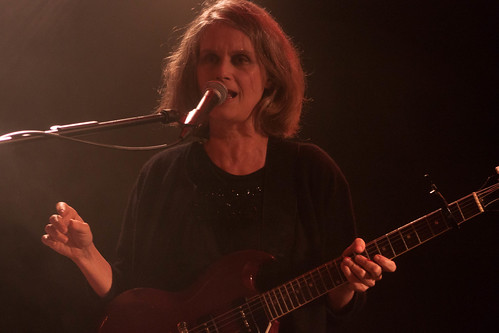Throughout the course of this site’s 10-plus year history, I’ve managed to spill quite a bit of virtual ink covering the Buenos Aires-born and based singer/songwriter, multi-instrumentalist, producer, actress and JOVM mainstay Juana Molina. Molina, who is the daughter of acclaimed of tango vocalist Horacio Molina and beloved actress Chunchuna Villafane, has led a rather interesting couple of lives. Much of her music career can be traced back to growing up in a intensely musical home: when she was five, her father taught her guitar and her mother introduced a young Molina to the family’s extensive record collection.
After the military coup of 1976, Molina’s family fled Argentina and lived in exile in Paris for several years. During her time in France, Molina’s musical tastes were vastly expanded by regularly listening to a number of French radio stations known for programs that spun music from all over the globe. Her family returned to Argentina, when she was in her early 20s. Much like countless young women across the globe, Molina was determined to be financially independent. Her initial aspirations were to earn some decent money for a few hours of work a day,. while allowing her enough time to write songs, record them and even play live shows.
Molina had a talent for imitations and impressions and while looking for a gig, she auditioned for a local TV program. She impressed the casting director with her talent, and she got hired on the spot. The Buenos Aires-born and-based JOVM mainstay quickly became one of Argentina’s most popular comedic actors. Within a few years of that early addiction, Molina starred in her own smash-hit show, Juana y sus hermanas, a Carol Burnett-like variety show, in which she created a number of beloved characters. (The show was so successful that it was syndicated across the region.) When Molina was pregnant, her show was on hiatus and with a lot of free time on her hands, she found herself reflecting on her life and her rapid rise to stardom. Despite the success she attained, Molina had the nagging thought that she really wasn’t doing what she really wanted to do. So she quit acting and started to focus on music.
Her decision to quit her successful and wildly popular show was one that many Argentines bitterly held against her for a number of years. True story here: her full-length debut 1996’s Rara was critically panned by a number of journalists, who openly resented her career change. Initially fans of Juana y sus hermanas would show up to her gigs, expecting her to pay homage to the show but they couldn’t quite understand her new “folk singer character” that sung very strange songs without obvious jokes. Feeling dejected and misunderstood by the criticism and demands on her, but still wanting to continue with music, Molina relocated to Los Angeles. Not only was her work much better received, while in L.A., she began experimenting and familiarizing herself with electronics and electronic sounds. 2002’s Tres Cosas was the Argentine artist’s international breakthrough: the album was championed by David Byrne, Will Oldham, and others and landed on The New York Times‘ Top Ten Records list.
2017’s Halo continued Molina’s long-held reputation for restless experimentation — and for being one of South America’s most innovative and uncompromising artists. But interestingly enough, last year’s Forfun EP was an exuberant and decided sonic change in direction, inspired by desperate necessity: the JOVM mainstay and her backing band were forced to play a set at a major festival without most of their electronic gear — because their airline lost their luggage. The EP’s material is centered around a wild, punk rock-like ethos and spirit.
Much like countless artists around the world, Molina was actually in the middle of a tour, playing festival dates when the pandemic stopped everything in its tracks. Interestingly enough, one of Molina’s last tour dates was festival set at Mexico’s NRML Festival. That set, which featured rearranged and re-imagined renditions of material off Halo, Wed 21, Un día and Forfun EP was recorded — and will be released as a live album ANRML, which Crammed Discs will put out on October 23, 2020.
Obviously, the live album will serve as a powerful reminder of what life was before the pandemic — but there’s also the hope of what will come out on the other side. We must continue to have hope that we’ll be able to enjoy each other like we once were; that we’ll be able to go to concerts to sing, dance, sweat and escape our worlds for a little bit; that we’ll have the bliss and freedom of strobe light and dance floors; of welcoming smiles from locals when you’re a stranger in a strange land; of new love and of so much more. We must continue to have hope that on the other side of this, we’ll make a better world for all of us.
The live album’s first single is a kicking and stomping version of one of my favorite Juana Molina songs “Eras.” And from the live recording, you can envision yourself dancing and howling with joy with a bunch of newfound friends. There are few things in our morally bankrupt world as transcendent as seeing someone’s face light up when their favorite artist in the entire universe plays their favorite song. I miss that in ways that I can’t even begin to describe. One day, I hope. One day.

